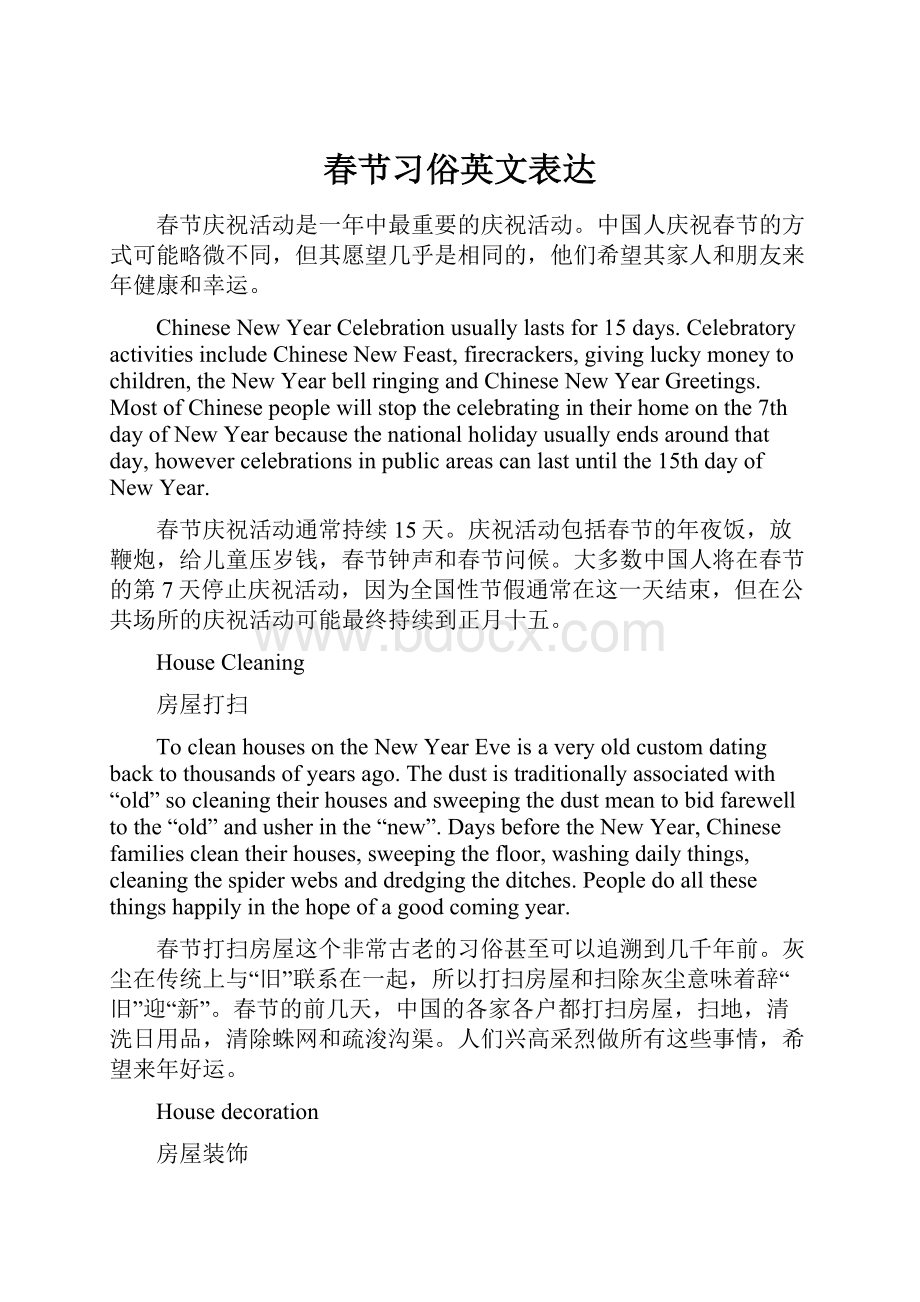春节习俗英文表达.docx
《春节习俗英文表达.docx》由会员分享,可在线阅读,更多相关《春节习俗英文表达.docx(13页珍藏版)》请在冰豆网上搜索。

春节习俗英文表达
春节庆祝活动是一年中最重要的庆祝活动。
中国人庆祝春节的方式可能略微不同,但其愿望几乎是相同的,他们希望其家人和朋友来年健康和幸运。
ChineseNewYearCelebrationusuallylastsfor15days.CelebratoryactivitiesincludeChineseNewFeast,firecrackers,givingluckymoneytochildren,theNewYearbellringingandChineseNewYearGreetings.MostofChinesepeoplewillstopthecelebratingintheirhomeonthe7thdayofNewYearbecausethenationalholidayusuallyendsaroundthatday,howevercelebrationsinpublicareascanlastuntilthe15thdayofNewYear.
春节庆祝活动通常持续15天。
庆祝活动包括春节的年夜饭,放鞭炮,给儿童压岁钱,春节钟声和春节问候。
大多数中国人将在春节的第7天停止庆祝活动,因为全国性节假通常在这一天结束,但在公共场所的庆祝活动可能最终持续到正月十五。
HouseCleaning
房屋打扫
TocleanhousesontheNewYearEveisaveryoldcustomdatingbacktothousandsofyearsago.Thedustistraditionallyassociatedwith“old”socleaningtheirhousesandsweepingthedustmeantobidfarewelltothe“old”andusherinthe“new”.DaysbeforetheNewYear,Chinesefamiliescleantheirhouses,sweepingthefloor,washingdailythings,cleaningthespiderwebsanddredgingtheditches.Peopledoallthesethingshappilyinthehopeofagoodcomingyear.
春节打扫房屋这个非常古老的习俗甚至可以追溯到几千年前。
灰尘在传统上与“旧”联系在一起,所以打扫房屋和扫除灰尘意味着辞“旧”迎“新”。
春节的前几天,中国的各家各户都打扫房屋,扫地,清洗日用品,清除蛛网和疏浚沟渠。
人们兴高采烈做所有这些事情,希望来年好运。
Housedecoration
房屋装饰
Oneofthehousedecorationsistopostcoupletsondoors.OntheSpringFestivalcouplets,goodwishesareexpressed.NewYearcoupletsareusuallypostedinpairsasevennumbersareassociatedwithgoodluckandauspiciousnessinChineseculture.
房屋装饰之一就是在门上贴对联。
在春联上,抒发良好的祝愿。
春联通常是成对张贴,因为双数在中国文化中是好运气和吉祥的象征。
PeopleinnorthChinaareusedtopostingpaper-cutontheirwindows.Whenstickingthewindowdecorationpaper-cuts,peoplepasteonthedoorlargeredChinesecharacter“fu”Ared"fu"meansgoodluckandfortune,soitiscustomarytopost"fu"ondoorsorwallsonauspiciousoccasionssuchaswedding,festivals.
在中国北方,人们习惯于在窗户上贴剪纸。
人们既在窗户上贴剪纸,又在大门上贴上大大的红色汉字“福”字,一个红色“福”字意味着好运和财富,因此习惯上在婚礼,节日之类的吉祥场合中,人们都会在门或墙上贴“福”字。
WaitingfortheFirstBellRingingofChineseNewYear
等待春节的第一声钟鸣
ThefirstbellringingisthesymbolofChineseNewYear.ChinesepeopleliketogotoalargesquareswheretherearehugebellsaresetuponNewYear’sEve.AstheNewYearapproachestheycountdownandcelebratetogether.Thepeoplebelievethattheringingofhugebellcandriveallthebadluckawayandbringthefortunetothem.Inrecentyears,somepeoplehavebegungoingtomountaintemplestowaitforthefirstringing.HanshanTempleinSuzhou,isveryfamoustempleforitsfirstringingofthebelltoheraldChineseNewYear.ManyforeignersnowgotoHanshanTempletocelebrateChineseNewYear.
第一次钟声是春节的象征。
中国人喜欢到一个大广场,那里有为除夕设置的大钟。
随着春节的临近,他们开始倒计数并一起庆祝。
人们相信了大钟的撞响可以驱除霉运,带来好运。
近年来,有些人开始去山上寺庙等待第一次钟声。
苏州的寒山寺就非常著名,它的钟声宣布春节的到来。
现在有许多外国人也去寒山寺庆祝春节。
Stayinguplate("Shousui")
熬夜(“守岁”)
ShousuimeanstostayuplateorallnightonNewYear'sEve.Afterthegreatdinner,familiessittogetherandchathappilytowaitfortheNewYear’sarrival.
守岁意味着除夕夜不睡觉。
年夜饭后,家人聚坐一起,愉快聊天,等待春节的到来。
NewYearFeast
年夜饭
SpringFestivalisatimeforfamilyreunion.TheNewYear'sFeastis"amust"banquetwithallthefamilymembersgettingtogether.ThefoodeatenontheNewYearEvebanquetvariesaccordingtoregions.InsouthChina,Itiscustomarytoeat"niangao"(NewYearcakemadeofglutinousriceflour)becauseasahomophone,niangaomeans"higherandhighereveryyear".Inthenorth,atraditionaldishforthefeastis"Jiaozi"ordumplingsshapedlikeacrescentmoon.
春节是与家人团聚的时间。
年夜饭是所有家庭成员聚在一起“必须”的宴会。
除夕宴会上吃的食物根据不同的地区各不相同。
在中国南方,习惯吃“年糕”(糯米粉制成的新年糕点),因为作为一个同音字,年糕意味着“步步高升”。
在北方,年夜饭的传统饭是“饺子”或像月牙儿形的汤圆。
SettingFirecrackers
燃放鞭炮
LightingFirecrackersusedtobeoneofthemostimportantcustomsintheSpringFestivalcelebration.However,concerningthedangerandthenegativenoisesthatlightingfirecrackersmaybring,thegovernmenthasbannedthispracticeinmanymajorcities.Butpeopleinsmalltownsandruralareasstillholdtothistraditionalcelebration.Rightastheclockstrikes12o'clockmidnightofNewYear'sEve,citiesandtownsarelitupwiththeglitterfromfireworks,andthesoundcanbedeafening.Familiesstayupforthisjoyfulmomentandkidswithfirecrackersinonehandandalighterinanothercheerfullylighttheirhappinessinthisespecialoccasion,eventhoughtheyplugtheirears.
放鞭炮曾是春节庆祝活动中最重要的习俗之一。
然而,担心燃放鞭炮可能会带来危险和烦人的噪音,政府已在许多大城市下令禁止燃放鞭炮。
但在小城镇和农村地区的人们仍然坚持这种传统的庆祝活动。
除夕夜一旦时钟撞响午夜12点钟,城市和乡镇都被烟花的闪闪光芒映亮,鞭炮声震耳欲聋。
一家人熬夜就为这个欢乐的时刻,孩子们一手拿鞭炮,一手拿火机兴高采烈地点放着他们在这个特殊节日的快乐,尽管他们吓得捂着耳朵。
NewYearGreetings(BaiNian)
春节的问候(拜年)
OnthefirstdayoftheNewYearorshortlythereafter,everybodywearsnewclothesandgreetsrelativesandfriendswithbowsandGongxi(congratulations),wishingeachothergoodluck,happinessduringthenewyear.InChinesevillages,somevillagersmayhavehundredsofrelativessotheyhavetospendmorethantwoweeksvisitingtheirrelatives.
在春节第一天或此后不久,大家都穿着新衣服,带着弓向亲戚和朋友打招呼并恭喜(祝贺),彼此祝愿在新的一年里好运,幸福。
在中国农村,有些村民可能有数以百计的亲戚,所以他们不得不拿出两个多星期来走亲访友。
Onthefirstdayofthenewyear,it’scustomaryfortheyoungergenerationstovisittheelders,wishingthemhealthyandlongevity.
春节第一天,按习惯,小一辈人要拜见老一辈,祝愿他们健康长寿。
Becausevisitingrelativesandfriendstakesalotoftime,now,somebusypeoplewillsendNewYearcardstoexpresstheirgoodwishesratherthanpayavisitpersonally.
因为探亲访友花费大量时间,所以,现在有些忙碌的人就送春节贺卡来表达他们的良好祝愿,而不是亲自去拜访。
LuckyMoney
压岁钱
ItisthemoneygiventokidsfromtheirparentsandgrandparentsasNewYeargift.Themoneyisbelievedtobringgoodluck,wardoffmonsters;hencethename"luckymoney".Parentsandgrandparentsfirstputmoneyinsmall,especially-maderedenvelopesandgivetheredenvelopestotheirkidsaftertheNewYear'sFeastorwhentheycometovisitthemontheNewYear.TheychoosetoputthemoneyinredenvelopesbecauseChinesepeoplethinkredisaluckycolor.Theywanttogivetheirchildrenbothluckymoneyandluckycolor.
这是孩子们的父母和祖父母给他们作为春节礼物的钱。
压岁钱据说能带来好运,能驱魔;因此,就有了“压岁钱”的称呼。
父母和祖父母先把钱放入特制的小红包里,年夜饭后或当孩子们来拜年时,将红包发给他们。
他们之所以要把钱放到红包里,是因为中国人认为红色是个幸运色。
他们想给自己孩子既有压岁钱还有幸运色。
‘中国新年(ChineseNewYear)’或‘春节(SpringFestival)’是最重要的中国传统节日(traditionalChineseholiday),也叫‘农历新年(LunarNewYear)’。
这个节日从农历正月初一(thefirstdayofthefirstlunarmonthintheChinesecalendar)开始,直到正月十五元宵节(LanternFestival)结束。
除夕(ChineseNewYear'sEve)的字面含义是‘Year-passEve’。
据说当初春节是为了纪念与一头叫做‘年’的神话野兽进行的斗争(fightagainstamythicalbeastcalled'Nian')。
中国的阴阳历(lunisolarcalendar)而不是公历(Gregoriancalendar)决定了春节的日期。
天干(heavenlystems)和地支(earthlybranches)用来纪年。
阴阳(yinandyang)与五行(thefiveelementsofChineseastrology)也用来描述一个具体年份。
很多人混淆了他的农历生年(Chinesebirth-year)和公历生年(Gregorianbirth-year)。
有些算命的人(signcalculators)也会混淆农历和阳历。
12年形成一个属相(animalzodiac)循环(cycle);60年形成一个综合循环。
十二属相(zodiacanimalsigns)包括:
鼠(rat)、牛(ox)、虎(tiger)、兔(rabbit)、龙(dragon)、蛇(snake)、马(horse)、羊(ram/sheep)、猴(monkey)、鸡(rooster)、狗(dog)与猪(pig)。
春节在很多国家和地区(countriesandterritories)都是公共假期(publicholiday),包括中国大陆、中国台湾、中国香港、中国澳门、马来西亚、新加坡、文莱(Brunei)、印度尼西亚和菲律宾。
还有一些国家以其它方式纪念中国春节,包括澳大利亚、加拿大、法国、新西兰和美国等。
在正式假期(officialholiday)前后,庆祝活动(celebrations/festivities)一直在进行。
各国对春节规定的法定假期(statutoryholiday)长短不一。
春节期间的庆祝活动中最重要的是拜访亲朋好友(visitstokin,relativesandfriends),即‘拜年(new-yearvisits)’。
青年人(juniors)和孩子(children)可以从已婚者(themarried)和长辈(theelders)那里拿到红包(redpackets/envelope)。
红包也叫压岁钱,是从‘压祟钱(themoneyusedtosuppressorputdowntheevilspirits)’发展而来。
钱数应为偶数(evennumbers),因为奇数(oddnumbers)不吉利。
数字4被认为不吉利,因为和‘死’同音(ahomophonewithdeath);数字8吉利,因为和‘发(wealth)’同音。
互赠礼物(giftexchange)也是人们之间常有的事儿。
春节前一般要彻底打扫卫生(athoroughcleaning),以扫掉前一年的坏运气(tosweepawaythebadluckoftheprecedingyear)并迎接好运(tobereadyforgoodluck)。
房间要用带有吉利话(auspiciousphrases)的剪纸(papercutouts)和春联(couplets)进行装饰。
信佛(Buddhism)和信道(Taoism)的人会将神坛(altar)与塑像(statues)清理干净。
某些地区的人会有‘送神(sendingtheGodhome)’的仪式。
灶王爷(KitchenGod)的纸人(papereffigy)会被烧掉以便让他去向玉帝(JadeEmperor)汇报这家人的好事(gooddeeds)和劣迹(transgressions)。
除夕最大的事儿就是吃团圆饭(reuniondinner),与西方的圣诞晚餐(Christmasdinner)的重要性类似。
年夜饭上往往会有鱼,但某些地区的人不吃它,留到第二天,以示‘年年有余(Maytherebesurpluseseveryyear),因为在汉语中‘鱼(fish)’与‘余(surplus)’同音。
在北方(northernChina),习惯上一定会在饭后开始包饺子(dumpling/jiaozi)并在午夜(aroundmidnight)煮食。
饺子象征财富(wealth),因为它外形像银锭(Chinesetael)。
在南方(southernChina),通常要做年糕(niangao/newyearcake)。
它的汉语发音表示越来越富有(increasinglyprosperous)。
现代的人们有时会进行倒计时(countdown)来迎接春节。
从上世纪八十年代开始,中国中央电视台春节联欢晚会(CCTVNewYear'sGala)会在每年的春节到来前开始播出。
鞭炮(firecrackers)和焰火(fireworks)也是制造节日气氛的重要工具,不过在很多城市被禁放(banned)以防止火灾(firehazards)。
政府会组织大型焰火(large-scalefireworks)燃放来庆祝节日。
初一从‘接神(welcomingthedeitiesoftheheavensandearth)’开始,随后就是拜年等活动。
初二是已婚妇女回娘家(formarrieddaughterstovisittheirbirthfamilies/parents)的日子。
有些人认为初三、初四不适合拜年,而适合上坟(grave-visiting)。
初五被认为是财神爷(godofwealth/fortunegod)的生日。
正月十五要吃元宵(ricedumplings:
asweetglutinousriceballbrewedinasoup)。
户外还要燃起蜡烛(candles)以引领游魂(waywardspirits)回到自己的家。
人们也会提着点燃的灯笼(lightedlanterns)逛街。
春节期间也有一些令局外人困惑的迷信(superstitiousbeliefs)或者传统文化观念(traditionalculturalbeliefs)。
比如贴红菱形纸(reddiamond-shapedposter)的‘福(auspiciousness)’字。
它常常被倒着贴(hangingupsidedown),因为汉语的‘倒(upsidedown)’与‘到(arrive)’是同音字(homophones)。
金元宝(yuanbaoingots)象征财富。
除了春联,年画(NewYearpictures)、中国结(Chineseknots)、剪纸(papercutting)等都用来增加气氛。
舞龙(dragondance)和舞狮(liondance)也是人们庆祝春节的传统活动。
人们打招呼会说一些吉祥话,如‘新年快乐(HappyNewYear)’、‘恭喜发财(Congratulationsandbeprosperous)’、‘岁岁平安(Everlastingpeaceyearafteryear)’等。
TheSpringFestivalisthemostimportantfestivalfortheChinesepeopleandiswhenallfamilymembersgettogether,
春节是我国民间最重要的传统节日,这是一家团聚的时刻,
justlikeChristmasintheWest.
就像西方的圣诞节一样.
ItoriginatedintheShangDynastyfromthepeople'ssacrificestogodsandancestors
春节起源于殷商时期祭神祭祖活动,
attheendofanoldyearandthebeginningofanewone.
在辞旧迎新之际。
DuringthelasttendaysbeforeSpringFestival,
在春节前最后十天,
storeownersarebusyaseverybodygoesouttopurchasenecessitiesfortheNewYear.
大小商铺生意兴隆,因为人们